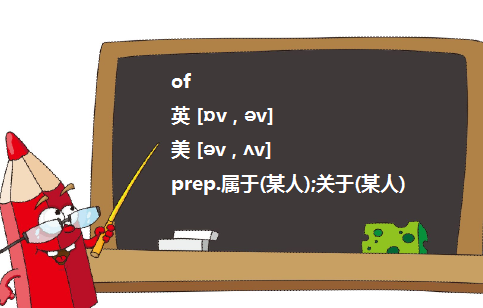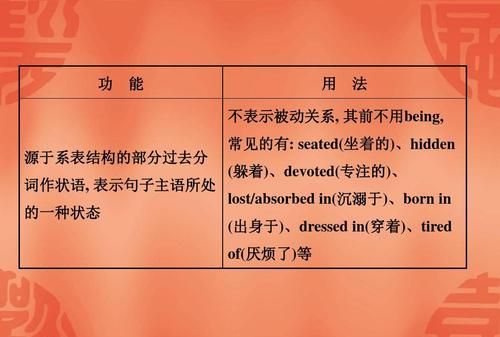本文目录
of的所有用法
1、[表示所属关系](属于)...的。
2、[表示关于](关于)...的。
3、[表示同位关系]。
4、[表示性质、内容 、状况等]。
5、[表示数量、种类]。
6、[表示部分或全部]。
7、[表示...中最突出的]。
8、[表示由...组成、做成]。
9、[表示动作的主体]。

扩展资料
of的近义词:by
by
读音:英 [baɪ] 美 [baɪ]
释义:表示使为者,表示方式。
语法:by在表示时间时,常与动词的一般时、将来时、完成时或将来完成时连用。作“在…时候”解时,常用于by day〔night〕短语中。by表示方式(除作“抓住…”解时)或原因后接名词时,名词前通常不加冠词。
例句:
We'll be travelling by car.
我们将开车旅行。
be动词后面为什么加to do
这是固定短语。如: be of +抽象名词(important,use,benifit, significance,help,value,necessity等)=be +形容词:
This book is of great value=This book is very valuable.
This is of great importance =This is very important.

of…of 的用法
OF的用法 分类:默认栏目表所属:
She was the girlfriend of my friend. 她是我朋友的女友。
I give him a book of mine. 我把我的一本书给了他。
表部分:
The wood of this desk is cracked. 这张桌子的木头裂开了。
表动宾:
It’s a waste of time. 这是浪费时间。
表同位:
The island of Hong Kong is a great trading centre. 香港这个岛屿是一个重要的贸易中心
Ui.biZ8ㄢミˋひUЫ
表主谓:
He has got the news of the death of her grandma. 他已知他奶奶去世的消息。
表情感:
It’s kind of you to say so. 你能这样说真是太好了。
It’s clever of the king to find the plot. 国王很聪明,发现了这个阴谋。
I am fond of music. 我喜欢音乐。
She is sick of city life. 她厌倦城市生活。
表属性:
He was a man of great determination. 他是个十分果断的人。
She is a girl of much ability. 她是一个能力很强的姑娘。
The book is of great value. 这本书很有价值。
链接of的用法
1. 表示"属于关系",意为"(属于)......的"。如:the leaves of the tree
2. 表示"(关于)......的"。如:stories of Lei Feng, a map of China
3. 表示"同位关系"。如:He lives in the city of Beijing.
4. 表示某人的品性。如:It's very kind of you to help me.
5. 表示"因为、由于"。如:die of cancer(死于癌症)
6. 用于一些固定短语中。如:Shirts and blouses are made of cotton. I have a lot of homework today.
7. 表示整体与部分的关系。如:three or four of your classmates,the end of the film(这部电影的片末部分)
Of的用法!
动词+of
a)动词+of。of意为“有关,由于”: beg of(sb.)请求某人,complain of抱怨,consist of由…构成, die of死于, dream of梦想, hear of听说, know of了解,speak of谈及, tell of讲到, think of想起, talk of论及。例如:
Never has one of them complained of all the trouble we give.从来没有人抱怨我们带来这么多麻烦。
Carbon dioxide consists of carbon and oxygen. 二氧化碳由碳、氧两种元素组成。
b)动词+sb.+of+sth.。其中of有“剥夺,有关”之意:accuse of控告(谴责,非难)某人, cheat of骗走, deprive of剥夺,inform of汇报, rob of抢走, remind of提醒, warn of警告。例如:
He has cheated me of my poverty. 他骗走了我的财产。
They are deprived of their rights as citizens.他们的公民权都被剥夺了。
c)动词+sth.+ of +sb.。介词of表动宾关系,后接动作的宾语
sb.:request of请求(某人做某事), require of要求得到。例如:
All I request of you is that you should come here early.我唯一的请求就是希望你早点来。
You have done all the law requires of you.你做的这一切都是法律对你的要求。

动词用作名词怎么理解
其实你的两个问题可以归结为一个问题,那就是动词后面为什么不直接加名词而非要加上OF,然后再加名词?
英语中的实意动词分为及物动词(后面可以直接跟名词代词或者动词-ing形式做宾语)和不及物动词(不可以直接接名词,代词或者动词-ing形式),那么当你使用了一个不及物动词,但是后面又需要接宾语,那么此时就需要选择一个适当的介词,of就是介词中的一个.至于动词为什么用-ing形式,那要看其前面的词的搭配来理解.例如:
They are talking about the girl.(这里的talk不可以直接加the girl,因为它不及物,需要借助介词)
Wemen are usually interested in talking about others.(这里的talking是因为前面介词in的要求)

以上就是关于动词后面加of怎么理解 ,of的所有用法的全部内容,以及动词后面加of怎么理解 的相关内容,希望能够帮到您。

